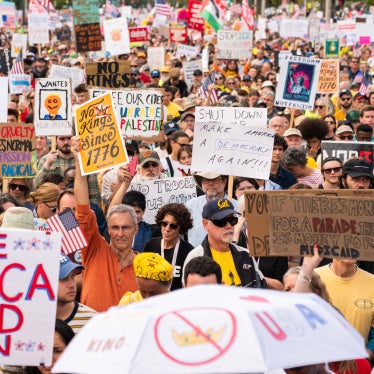Word came from the street: A mob had gathered in front of the ground-floor door, blocking the exit from the offices of the Hisham Mubarak Law Center, a pioneering Egyptian human rights organization.
Former director Ahmed Seif knew what was coming: a raid. He advised the rest of us to sit tight and not resist, so as not to "provoke them into violence." And then they came. Burly men with big clubs, others in sports jackets typical of state security agents, and a uniformed policeman. Then a surprise: military police in their characteristic red berets.
The army has presented itself as a neutral force during the ongoing efforts by pro-democracy groups and citizens to unseat President Hosni Mubarak. Yet, members of the military police were clearly in charge of the Feb. 3 raid at the law center. For the next 36 hours, those of us who were there that day - more than 20 activists, journalists and researchers - got a close-up view of the Egyptian government's old, repressive ways: arbitrary arrest, isolation and intimidation. And the military was calling the shots from beginning to end.
The saga provided insight into a key question about Egypt's tumult: Where does the army stand in the epic struggle for Egypt's future? Will the "transition" out of Mubarak's 29-year rule lead to an end to political repression, torture, fake elections and strict curbs on speech, assembly and association? Or is the outcome more likely to be Mubarak-ism without Mubarak, with military overseers preserving the old system under a new guise?
The military men leading the operation at the law center didn't act neutral. One soldier harangued us about the "suspicious meeting" and about foreigners bent on "ruining our country." Plainclothes enforcers smashed windows and rifled the center's files. We were ordered to sit on the floor and turn over our possessions. The uniformed policeman approached me and accused me of spying. "You're from the Mossad!" he yelled, referring to Israel's intelligence agency. I explained that I was from Human Rights Watch, though judging by his scowl, that didn't seem any better a credential.
Our hands were cuffed tightly and painfully behind our backs, and we were taken to a stairwell to sit for about 10 hours. When a soldier noticed I was chewing gum, he gave me four slaps on the back of the head. I spit it out. A major general in desert camouflage showed up. At his order, we were taken downstairs, paraded through a mob on the street, put on two buses and taken to Camp 75, a military base in far northeast Cairo.
At Camp 75, the handcuffs came off and blindfolds went on. My interrogation was mild, short and in English. Why was I visiting the Hisham Mubarak Law Center? What exactly does Human Rights Watch do? Why did I have visas from Yemen and Tunisia in this passport? For the next 24 hours, still blindfolded, I sat and squirmed fitfully on the pavement; we couldn't get up except to use the toilet, and then only with permission. On Feb. 4, just before midnight, five foreigners, including me, were released. With the aid of a kindly army officer at a checkpoint, we found a hotel willing to take us. The next morning the rest of the group was let out.
I suspect our experience was mild compared to what some Egyptian detainees experience. At Camp 75, we heard howls of pain echoing loudly through the halls. Last week, Human Rights Watch published a 95-page report on how the dreaded security forces do their dirty work in Egypt, and the widespread and systematic use of torture against many thousands of Egyptians under Mubarak's rule.
Egypt's future, even without Mubarak, will be bleak unless it eliminates abusive practices by the country's security forces. In our case, as well as others now being documented by Human Rights Watch, the army was clearly in charge of arbitrary and sometimes violent arrests, even if beatings and other abuse were done by people from other agencies or gangs of thugs.
What's at stake in the current struggle playing out in Tahrir Square and across Egypt is not only Mubarak's fate but also the prerogatives of the Egyptian military within a system it created. Since the 1952 coup that overthrew the monarchy, military men - Gamal Abdel Nasser, Anwar Sadat and Mubarak - have held Egypt's supreme lever of power: the presidency. Until 2005, presidential elections were one-candidate referendums. In 2005, when multiple candidates were permitted, the second-place finisher, Ayman Nour, was hustled into four years' imprisonment on trumped-up fraud charges shortly after the vote. All governorships in Egypt are held by current or former military officers. Omar Suleiman, the new vice president, is a general. Ahmed Shafik, the new prime minister, is a retired air marshal.
In Egypt, the military is not a profession; it's a ruling caste.
To reduce suspicion that, in military hands, the brutal past is but prologue, the government needs to immediately protect basic rights, end arbitrary arrests and ill-treatment in custody, and ensure free expression and association, including keeping open Internet and communications channels throughout the country. This means lifting without delay the 30-year-old emergency law that has long been the legal justification to curb the rights of the Egyptian people.
The repressive system at the heart of Egypt's crisis was created by the army during the 59 years it has been calling the shots. Unless the U.S. and other key actors who can influence Egypt's military quickly advance a democratic transition to dismantle this system, the result of the current turmoil will be no more than a debate about the date of Mubarak's departure.
Daniel Williams is a senior researcher in the emergencies division of Human Rights Watch. He was previously a foreign correspondent for the Los Angeles Times, and has covered the Middle East for the last decade.






